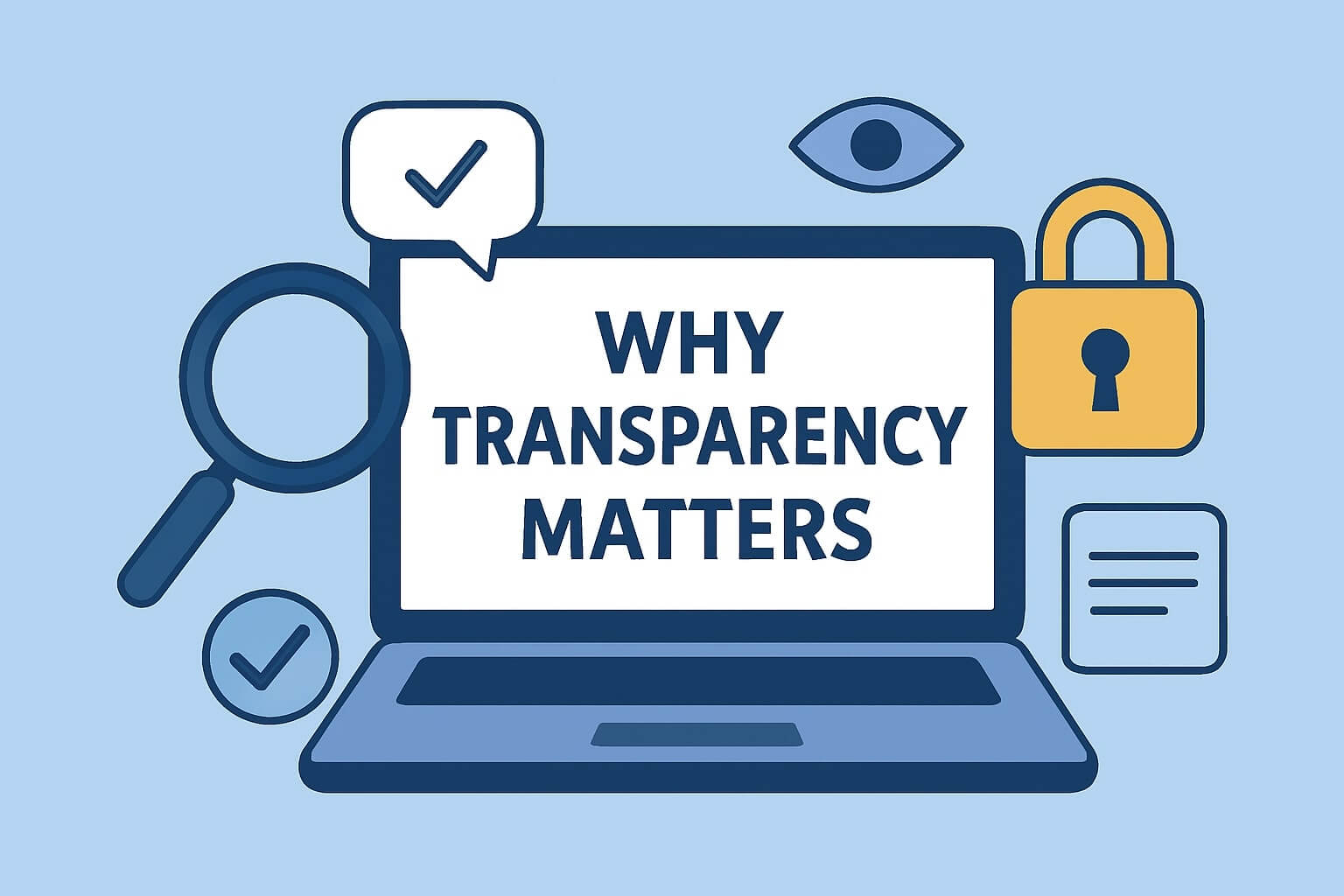Transparency is no longer a nice-to-have—it’s an expectation. In 2025, customers are more informed, more connected, and more selective than ever before. They can easily compare brands, read reviews, and expose dishonest practices. For businesses that want to thrive, being open and transparent is no longer optional; it’s essential.
But what does “transparency” really mean in a business context, and why does it matter so much right now? Let’s break it down.
The Link Between Transparency and Trust
When businesses are honest about their products, services, and policies, they build trust. Customers value brands that admit mistakes, respond to feedback, and show their human side.
In fact, according to 50 Online Review Statistics Every Business Owner Should Know in 2025, 88% of people say they trust businesses more when they respond openly to both positive and negative reviews. This demonstrates that transparency doesn’t mean being perfect—it means being honest and accountable.
Why Trust Is the Currency of 2025
- Choice overload: Consumers today face more choices than ever. Trust acts as a filter.
- Online visibility: Brands without trust signals (reviews, ratings, transparency) struggle to stand out.
- Loyalty factor: Trust leads to repeat business—something cheaper ads or discounts can’t buy.
Without trust, even the best products can be overlooked. With trust, even a small business can outshine a giant competitor.
Standing Out in a Competitive Market
In an era where some review platforms face criticism for hiding or removing reviews, businesses that are fully transparent can stand out. By showcasing all customer feedback, not just the positive, companies demonstrate confidence in their service and a genuine commitment to improvement.
Think about it: which company feels more authentic—one with 1,000 reviews and a perfect 5-star score, or one with 950 positive reviews and 50 critical ones, all with thoughtful business responses? The latter often comes across as more genuine.
The Danger of Selective Transparency
- Overly polished reputations: Customers are savvy. They can tell when reviews are “too good to be true.”
- Social backlash: When hidden reviews or shady practices come to light, the reputational damage is worse than if the company had simply been honest.
- Competitive disadvantage: Companies that hide criticism risk losing customers to competitors who embrace openness.
This is where platforms like Rated Stores are positioned to make a real difference: by giving consumers the full story, not a filtered version.
How Businesses Can Embrace Transparency
1. Display Authentic Reviews
Don’t filter out the negatives. A study by Spiegel Research Center found that products with reviews between 4.2–4.5 stars often sell better than those with perfect 5-star ratings because they feel more believable.
2. Respond Openly
A thoughtful reply to criticism shows character. Customers know mistakes happen—it’s the response that defines your reputation. Even a simple “Thanks for pointing this out—we’re fixing it” can turn a critic into a fan.
3. Be Clear With Policies
Hidden terms or confusing fine print erode confidence. Be upfront about pricing, shipping times, refund policies, and any limitations. Customers appreciate knowing what to expect before they buy.
4. Admit Mistakes
Owning up to errors shows humility and accountability. For example, some companies now publish “transparency reports” that openly admit where things went wrong and what’s being done to improve.
5. Go Beyond Compliance
Transparency isn’t just about meeting legal requirements—it’s about setting higher standards. Share behind-the-scenes content, sustainability reports, or even staff stories. These all humanize your brand and strengthen trust.
Real-World Examples of Transparency in Action
- Patagonia: Publishes detailed supply chain reports, showing customers exactly where materials come from—even when it reveals challenges.
- Zappos: Built its brand on customer service transparency, with stories of reps going above and beyond.
- Tesla: Shares updates and mistakes directly from leadership, often in real-time via social channels.
These companies prove that being open doesn’t weaken a brand—it strengthens it.
The Role of Transparency in SEO
Transparency doesn’t just build customer trust—it also boosts your visibility online. Here’s how:
- Authentic reviews increase keyword diversity, helping your site rank for more search terms.
- Open responses to reviews signal activity and freshness to search engines.
- Clear product pages with honest details reduce bounce rates, which improves rankings.
For example, when businesses link to related resources—like this article linking to The Ultimate Guide to Reputation Management in 2025—it strengthens both SEO and user experience.
Overcoming the Fear of Transparency
Many businesses hesitate to be fully transparent because they fear criticism. But here’s the truth: customers already talk about your business, whether you engage or not.
Being part of that conversation allows you to:
- Address issues before they escalate.
- Show future customers you care.
- Build credibility through accountability.
In the long run, transparency protects your reputation far more than silence ever could.
The Future Belongs to Honest Brands
As consumer skepticism grows, transparency will increasingly become a key differentiator. Customers don’t just want great products—they want brands that are authentic, accountable, and trustworthy.
Businesses that embrace openness will not only attract loyal customers but also build a stronger, more resilient reputation. In 2025 and beyond, the companies that win won’t be the ones with the slickest ads—they’ll be the ones with nothing to hide.
Key Takeaways
- Transparency is now a requirement, not a luxury.
- Trust built on honesty leads to long-term loyalty.
- Businesses that embrace all feedback stand out in competitive markets.
- SEO benefits directly from transparent practices.
- The future of branding is clear: authenticity beats perfection.
Final Thought: Transparency is more than a business strategy—it’s a mindset. The more open and honest your company is, the more customers will not just buy from you but believe in you.
